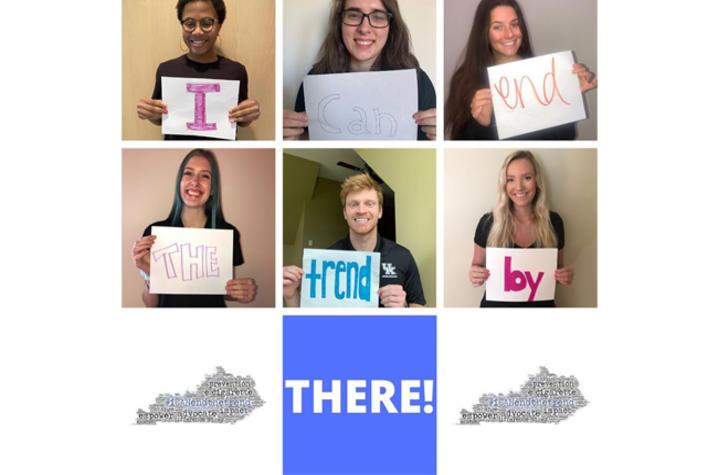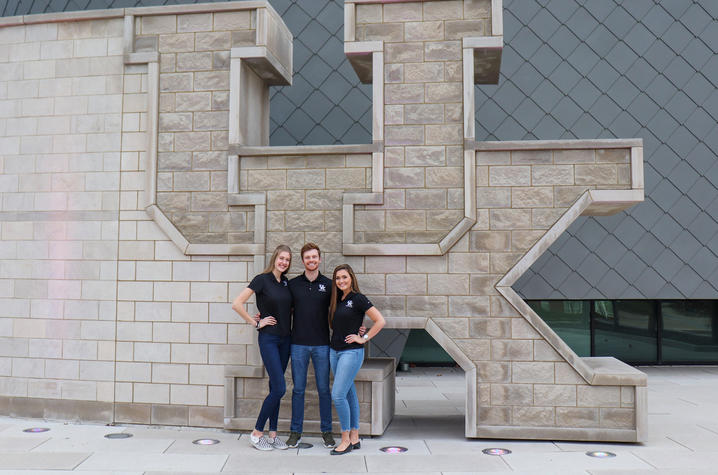#iCANendthetrend Provides Virtual Support for Students Across Kentucky
LEXINGTON, Ky. (May 21, 2020) – The global pandemic changed how students everywhere learn and engage with their peers. Core classes now take the form of Zoom meetings and online assignments, with varying degrees of success; educators are working hard to keep their students on track. However, there is one area in which a dedicated group of UK students is determined to help Kentucky’s elementary, middle and high school students succeed: ending the trend of teen vaping.
College student facilitators who are part of UK’s #iCANendthetrend evidence-informed prevention and empowerment program work with students to build awareness on the dangers of e-cigarette use and the cost associated with nicotine dependence. They also strive to build skills related to refusal techniques and identify ways youth are targeted by the tobacco industry. Using a "peer-to-peer" model, trained UK college facilitators empower younger generations to end the trend of e-cigarette use. Peer models have been found effective when talking about general tobacco use and prevention as well as other health behaviors. Since its inception in 2019, the facilitators have engaged with over 5,000 students across Kentucky.
Previously, the #iCANendthetrend team would go to schools around the Commonwealth and present information and encourage student dialogue through in-person activities. However, when all K-12 schools in Kentucky moved to a remote learning model, the college facilitators quickly adapted to ensure they were still reaching adults working with youth and young people across Kentucky.
“We had to adjust our approach in several different ways,” said Hayley Leach, recent UK graduate and #iCANendthetrend facilitator. “First, we had to re-work our presentations to make sure they would work in a virtual format. We wanted to make sure that students still had the opportunity to engage with us throughout our lessons and complete skill-building and empowering activities.”
Leach reinforced that the updated programming incorporates messaging about the current world we are living in with COVID-19. “We explain that youth are not immune to COVID-19 and how the risks of vaping may cause further complications if they were to contract the virus. We also talk about ways to find balance and deal with stress during times of social distancing.”
“Our college facilitators quickly adapted given the work-from-home and remote learning circumstances resulting from COVID-19,” said Melinda Ickes, Ph.D., professor in the UK Department of Kinesiology and Health Promotion and director for #iCANendthetrend. “While national organizations continue to share relevant information on e-cigarette prevention, we have worked hard to ensure our tailored peer-to-peer model is very much intact. In addition to our updated live virtual programming option, facilitators have developed live streaming videos, engaging social media content, and challenges relevant to youth. The college facilitators are role models and reinforce what empowering younger generations can do to make an impact in their community.”
The facilitators engage with students via online classroom learning platforms, as well as through social media like Facebook, Instagram, and TikTok. For our partner and youth outreach, each week, facilitators focus on a new topic important to affect the e-cigarette epidemic. The facilitators post a short informational video about topics shared on social media, host activities such as trivia Tuesday on Instagram where followers are asked trivia questions related to e-cigarettes, and feature "day in the life" videos of the program facilitators. As an example, during our “Be Your Own Influencer,” week, students, young adults, and educators learned to lead the way in being tobacco and e-cigarette free by serving as "influencers" for those around them. The team even has a monthly newsletter for community partners and one specific to youth is in the works.
“I am amazed at the growth in our facilitators during this time,” said Ickes. “Not only are they learning about the science and value in staying updated on the ever-changing landscape of e-cigarettes, but they are thinking outside of the box and connecting with youth and adults across the Commonwealth in innovative ways.” To learn more or get involved with #iCANendthetrend, email: icanendthetrend@uky.edu
Other opportunities to engage with young people include the professional learning series workshops offered by the UK College of Education. One option, The Empowering Young People for Change workshop, supports adults to better understand the current generation of youth, foundations of youth engagement, and best practices for engaging youth as change agents.
Ickes reinforces the importance of engaging young people, “The Empowering Young People for Change workshop connects with our #iCANendthetrend work in many ways. Through this work, I am continually reminded of the potential in engaging young people as change agents. Many adults also recognize the importance of engaging youth but do not know where to begin. I am excited to connect with adults who want to develop strategies to empower young people.”
This fully online, self-paced, professional development opportunity will support adults to better understand the current generation of youth and best practices for engaging youth. Participants will also have the opportunity to develop their own tailored action plan to engage youth specifically in health and/or social justice issues in which they are most interested. Online registration for the workshop ends May 30 and the workshop begins June 8.
As the state’s flagship, land-grant institution, the University of Kentucky exists to advance the Commonwealth. We do that by preparing the next generation of leaders — placing students at the heart of everything we do — and transforming the lives of Kentuckians through education, research and creative work, service and health care. We pride ourselves on being a catalyst for breakthroughs and a force for healing, a place where ingenuity unfolds. It's all made possible by our people — visionaries, disruptors and pioneers — who make up 200 academic programs, a $476.5 million research and development enterprise and a world-class medical center, all on one campus.






